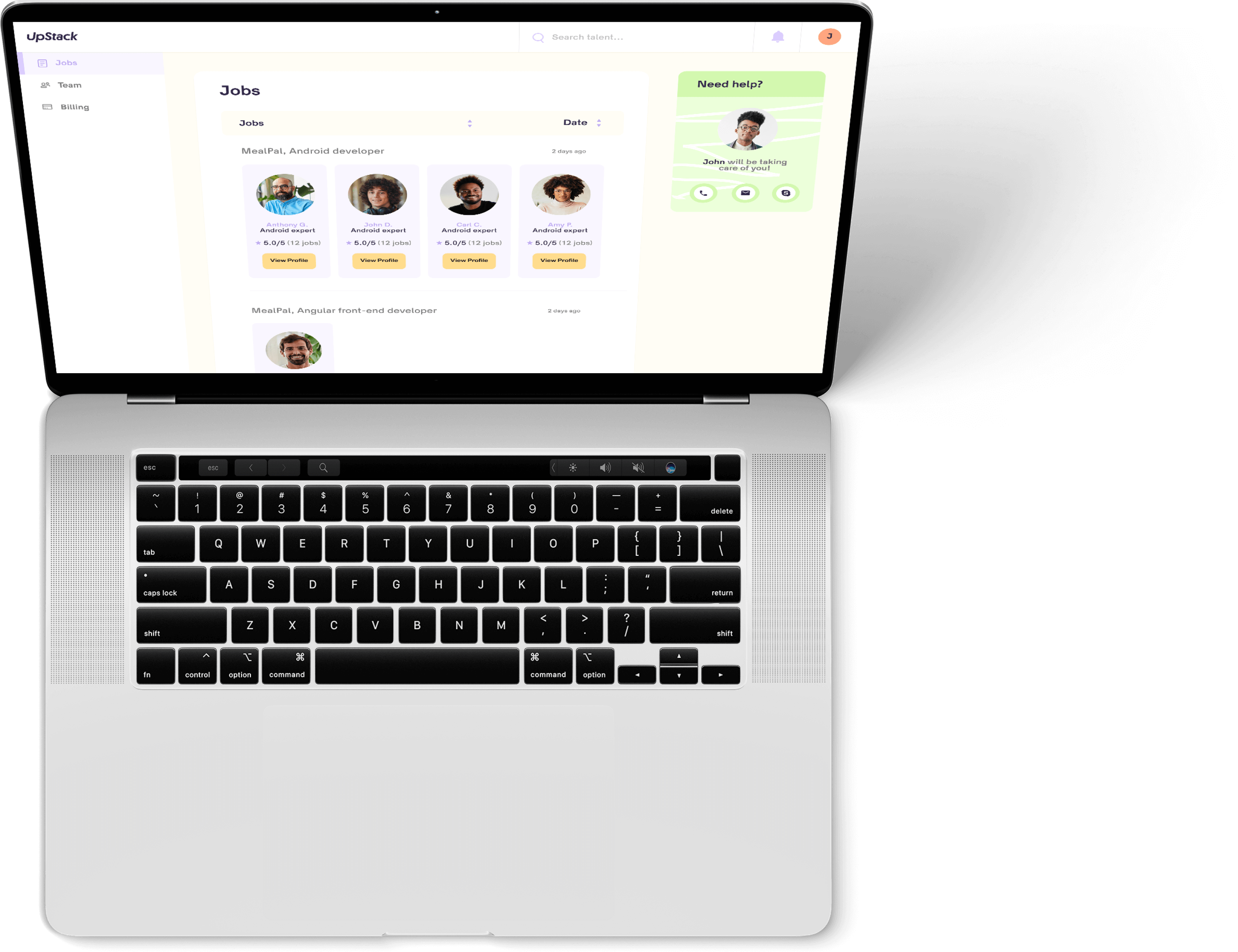


Hire SQL Developers Remotely {Devs Ready!}
Stella B.
Available
Sql Developer
-
Experienced Sql engineer with seamless project implementation
-
Loves guacamole & hates spoilers

-
Marcus T.
Available
Sql Engineer
-
Stacked portfolio of beautiful, functional websites
-
Known for his epic charcuterie & cheese boards

-
David M.
Available
Mobile Developer
-
Mobile engineering guru with a knack for translating stakeholder needs
-
Would rather be diving Palau's Blue Corner

-
Top SQL Developers with UpStack
Hire SQL Developers with UpStack
Are you looking for an experienced SQL developer to help develop your next big project? If so, you’ve come to the right place. In this ultimate guide to hiring an experienced SQL developer, you’ll learn the key qualities to look for in a programmer and the steps you need to take to make sure you get the best developer for your project. With the right knowledge and a bit of research, you can find an experienced and talented SQL developer that can help you achieve your goals. Keep reading to find out more.
What is an SQL Developer?
SQL (structured query language) is one of the most popular programming languages in the world. It is commonly used for data management, data analysis and data visualization. But, it can also be used for all sorts of other applications, making it a great language to have in your back pocket if you’re in the data or programming space. SQL is used to access and manage data from relational databases. It is often used to query databases that are in the form of Excel spreadsheets, Oracle tables, and Microsoft SQL Server databases. Many companies use SQL to store their data because it is easy to use, widely adopted and can be accessed by many different types of devices. Since SQL is such a common language, many companies hire developers who are skilled in this language. These developers can help companies manage and organize their data in a secure, efficient way. If you’re looking to hire an experienced SQL programmer, you can expect them to understand the data that you have, where it is coming from, and where you want it to go. They will be able to use their data to create reports, visualize data in new ways, and help protect your data against cyber threats. SQL programmers are critical members of most organizations, and they are often in high demand. If you want to hire an experienced SQL developer, it is important to make sure you are hiring the right person for the job.
What Qualities Should You Look for in an Experienced SQL Programmer?
There are many qualities that go into making a great SQL developer. These include technical skills, experience, communication skills, and personality. You may be able to find someone who excels in one area, but it is unlikely that you will find one who excels in all areas. You should hire someone who will be an asset to your team and who you can work well with. You should hire someone who has the skills to do the job, but also someone who you feel comfortable working with. The best person for the job may not be the person who has the most experience, the most certifications, or the highest salary. Hiring the right person for the job all comes down to the core competencies that they have and how they interact with others. When hiring an experienced SQL developer, look for someone who has the following qualities: - An eagerness to learn new things - An ability to take initiative - A willingness to go above and beyond - A positive attitude - Excellent communication skills - A love of data - A passion for what they do - A desire to work in a team environment - A strong desire to do a great job and be successful
What Steps Should I Take Before Hiring an Experienced SQL Developer?
If you are looking for an experienced SQL developer, then you probably have a vision for the project that you want to accomplish with them. Before you start your search for the best candidate, you should have a clear idea of what the project is, what you are hoping to accomplish, and what is expected of the SQL developer. You should also know exactly how much money you have to spend and how much time you have to complete the project. This will help you narrow down your search and find the best SQL developer for the project. Here are some steps to take before hiring an experienced SQL developer: - Know what you are hiring them for - Know your budget - Know how long you have to complete the project - Know what qualities you want in the candidate - Know what you want the candidate to accomplish - Know what your company is like - Know what the typical workload is like - Know what the culture is like - Know what the benefits package looks like - Know what the company culture looks like - Know where your company is located - Know if the project is located in the same place where the candidate will be - Know where the candidate is located
How to Evaluate an Experienced SQL Programmer?
One of the best ways to evaluate an experienced SQL programmer is to interview them. Make sure that you are interviewing them in a setting where they feel comfortable and where they can show their true potential. You want to look for people who are enthusiastic, eager to learn new things, and who can ask great questions. You want to look for people who have a positive attitude, can communicate well, and who want to be a part of the team. You want to look for someone who wants to do a great job and be successful. The interview process is a two-way street. You are interviewing them to see if they are the right person for the job, but they are also interviewing you to see if they want to work for your company. You want to make sure that you are prepared for the interview in advance so you can make the most of your time with the candidate. You can use the following tips to help you evaluate an experienced SQL programmer: - Know what you are looking for in the candidate - Ask open-ended questions - Ask behavioral questions - Ask about their background - Ask about their past experiences - Ask if they have any questions for you
What is the Best Way to Onboard an Experienced SQL Developer?
The onboarding process is crucial when bringing on a new team member, especially if they are an experienced SQL programmer. New hires want to feel like they are being welcomed into the organization, but they also want to know what is expected of them. Make sure you have everything that the new employee needs to onboard as quickly as possible. This includes their computer login, their work email address, their work phone number, their work schedule, and where they will be working. It also includes their login information to any company resources they may need, like the company intranet or online forums. The onboarding process should also include a meeting with their manager. The manager should have a clear idea of what the employee is doing and what resources they have available. They should also have a clear idea of any projects that are currently in the works and any projects that are coming up. The manager should also be prepared to answer any questions that the employee may have about the company as a whole or about the role itself.
What is the Best Way to Manage an Experienced SQL Developer?
The best way to manage an experienced SQL programmer is to make sure that you are clear about what they are working on. You want to make sure that you are staying organized, giving your team members clear instructions, and keeping track of their progress. This will help you make sure that everyone is on track, everyone has everything they need to get the job done, and you can stay on top of your workload. You should also make sure that you are offering regular feedback. This can include both positive and constructive feedback. This can include feedback on the quality of their work and feedback on how they can do things better. This can also be a great way to build a relationship with your team members and make them feel appreciated. You can also make sure that you are providing regular feedback to your team members on how they are doing and how they can be better.
They trust Our Sql Developers
Why hire a Sql developer with UpStack
![Sql Developer and Programmer]()
Top Sql talent pre-vetted for a perfect fit.
Our 8-point assessment evaluation ensures that every senior Sql developer you interview exceeds expectations across technical, cultural, and language criteria.
![Sql Programmers Computer Icon]()
Hire reliable, passionate Sql developers.
From late-night sprints to jumping on a last-minute face-to-face, we ensure that your recruits are down to get the job done right.
![Sql Programmers High Five Icon]()
Risk-free 14-day trial.
Confidently onboard candidates with our no-questions-asked trial period. We'll walk you through the contract-to-hire process if and when you're ready to make it permanent with your new Sql engineer.
![Sql Computer Programmer Icon]()
Our Client Success Experts provide white-glove service.
Stay laser-focused on your business goals while our team of experts curates potential candidates and manages seamless programmer onboarding.
![Sql Developer Writing Notes Icon]()
Build your optimal team confidently, quickly.
UpStack handles everything including background and reference checks, legal issues, and more. Our platform streamlines billing, timesheets, and payment all in one easy-to-access place.
Schedule a call with a Client Success Expert to get starting hiring a Sql developer.
Start hiring Start hiring Start hiring
Hire from the Best.
Working with our Client Success Experts, we'll help you build the remote team of your dreams with top Sql talent from around the world.
Pre-vetted, reliable Sql developers are standing by.





Hiring Sql Developers | FAQs
How much does it cost to hire a Sql developer?
UpStack has a simple billing model where each Sql developer has a standard hourly rate averaging between $65-$75 per hour. Rates are based on skills, knowledge, and experience, and our developers are available mainly for full-time engagement (40 hours per week) and the occasional part-time opportunity (20 hours per week).
What is the process to find a Sql developer?
You'll connect with an UpStack Client Success Manager to determine your immediate needs. Our team uses a combination of AI and personal assessment to short-list candidates that match your job requirements. From there, you interview, select, and onboard the perfect developer, all within days of your initial call.
How does UpStack find its Sql developers?
UpStack's talent recruitment team connects with software developers around the globe every day. Each Sql programmer is vetted for technical, communication, and other soft skills necessary for a developer to successfully work with your team. Once vetted, the candidates are accepted into the UpStack developer community.
How is UpStack different from an agency or recruiter?
UpStack's community of available, pre-vetted engineering talent means minimizing roadblocks to scaling your team effectively, efficiently, and immediately. Our Client Success Experts work with you and your UpStack developer to ensure a smooth and seamless engagement.
Can I hire UpStack Sql developers directly?
Yes, you can hire UpStack Sql developers at any time, and with the same assurance of smoothly on boarding talent risk-free. First, we'd create a job opening on our portal. Then, we'd vet, interview, and match developers that meet your needs. If you're satisfied at the end of the 14-day trial period, at any time you can directly hire them.
Common SQL FAQs
What is SQL?
SQL (Structured Query Language) is a programming language that is used to manage and manipulate data stored in relational databases. Relational databases are a type of database that stores data in the form of tables, with rows representing individual records and columns representing the attributes or fields of those records. SQL is a standard language that is used by database management systems (DBMS) to create, read, update, and delete (CRUD) records in a database. It is a declarative language, which means that you specify what you want to do, rather than how to do it.
For example, you can use SQL to create a new table in a database, insert data into a table, retrieve specific data from a table, update existing data in a table, or delete data from a table. SQL can also be used to perform advanced tasks such as creating views, stored procedures, and triggers, and to query and join data from multiple tables. SQL is an essential tool for anyone who works with data in a professional setting, and it is used in a wide range of industries, including finance, healthcare, and e-commerce.
How do I connect live ODBC driver to SQL server?
To connect a live ODBC driver to a SQL Server database, you can follow these steps:
- 1. Install the ODBC driver for SQL Server on your computer. You can download the driver from the Microsoft website (https://www.microsoft.com/en-us/sql-server/developer-get-started/odbc/).
- 2. Open the ODBC Data Source Administrator. On Windows, you can do this by going to Start > Control Panel > Administrative Tools > Data Sources (ODBC).
- 3. In the ODBC Data Source Administrator, click the "System DSN" tab.
- 4. Click the "Add" button to create a new system data source.
- 5. Select the ODBC driver for SQL Server from the list of available drivers and click "Finish".
- 6. In the "Create a New Data Source to SQL Server" dialog, enter a name for the data source and the server name where the SQL Server database is located. You may also need to specify the authentication method and enter a username and password if the database requires it.
- 7. Click "Next" and then "Finish" to complete the setup process.
- 8. Test the connection by clicking the "Test Data Source" button. If the connection is successful, you will see a message saying "Tests completed successfully".
Once the ODBC driver is set up, you can use it to connect to the SQL Server database from any application that supports ODBC connections, such as Microsoft Excel or Access. You can also use the driver to connect to the database using programming languages such as C++ or Python.
Is SQL a programming language?
Yes, SQL (Structured Query Language) is a programming language that is used to manage and manipulate data stored in relational databases. It is specifically designed for working with data in a structured way, and it is widely used in a variety of industries and applications that require the storage and management of large amounts of data. SQL is a standard language that is used by database management systems (DBMS) to create, read, update, and delete (CRUD) records in a database. It is a declarative language, which means that you specify what you want to do, rather than how to do it.
For example, you can use SQL to create a new table in a database, insert data into a table, retrieve specific data from a table, update existing data in a table, or delete data from a table. SQL can also be used to perform advanced tasks such as creating views, stored procedures, and triggers, and to query and join data from multiple tables. Overall, SQL is an essential tool for anyone who works with data in a professional setting, and it is considered a programming language because it allows you to perform a wide range of operations on data stored in a database.
What is a SQL constraint?
In SQL, a constraint is a rule that specifies the conditions that must be met for data to be inserted or updated in a database table. Constraints are used to ensure the integrity and accuracy of data in a database, and they can be used to enforce rules such as uniqueness, nullability, and foreign key relationships. There are several types of constraints that can be used in SQL, including:
- NOT NULL: This constraint specifies that a column cannot contain a null value.
- UNIQUE: This constraint specifies that the values in a column must be unique.
- PRIMARY KEY: This constraint specifies that a column (or a combination of columns) is the primary key of the table, which means that the values in the column must be unique and not null.
- FOREIGN KEY: This constraint specifies that the values in a column must match the values in a primary key column in another table. This is used to establish a relationship between two tables.
- CHECK: This constraint specifies a condition that must be met for data to be inserted or updated in a column.
Constraints are defined when a table is created, and they are enforced by the database management system (DBMS) to ensure the integrity of the data in the table. Constraints can be used to prevent data inconsistencies and errors, and they can help to ensure that the data in a database is accurate and reliable.
What is int in SQL?
In SQL, INT is a data type that is used to store integer values. An integer is a whole number that can be positive, negative, or zero. INT is a common data type in SQL, and it is used to store numerical values that do not have a decimal component. The INT data type can store a range of values, depending on the size of the field. For example, the INT data type can store values ranging from -2147483648 to 2147483647 in a 4-byte field. If you need to store larger values, you can use the BIGINT data type, which can store values up to 9,223,372,036,854,775,807.
To define a column as an INT data type in SQL, you can use the following syntax:
Copy codeCREATE TABLE table_name ( column_name INT );
You can also specify the size of the INT field by using the INT(size) syntax. For example, INT(11) would create a field that can store integer values up to 11 digits in length. INT is a common data type in SQL, and it is used to store a wide range of numerical values, including counts, quantities, and other types of data that do not require a decimal component.















